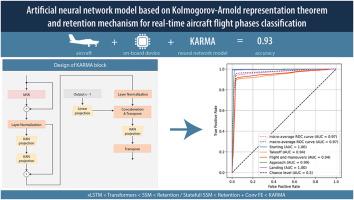基于Kolmogorov-Arnold表示定理和保持机制的人工神经网络模型用于飞机飞行阶段实时分类
IF 8
2区 计算机科学
Q1 AUTOMATION & CONTROL SYSTEMS
Engineering Applications of Artificial Intelligence
Pub Date : 2025-08-12
DOI:10.1016/j.engappai.2025.112004
引用次数: 0
摘要
在现代航空中,准确的飞行阶段分类对于飞行安全和效率,以及可靠的空中交通建模和预测至关重要。本文介绍了一种新颖的人工神经网络KARMA (Kolmogorov-Arnold Retention Memory Aware),它独特地将Kolmogorov-Arnold表示定理与多尺度保留机制相结合,用于实时飞行相位分类。KARMA采用Kolmogorov-Arnold网络(KAN)层进行灵活的函数逼近,并采用卷积特征提取来增强时间数据处理。该模型还具有一个内存聚合块,用于跨顺序预测维护上下文。针对最先进的模型——包括变形金刚、保留网络、扩展长短期记忆和状态空间模型——的基准测试表明,KARMA达到了卓越的准确性。KARMA模型的准确率为0.93,精密度为0.93,召回率为0.96。此外,该研究还引入了一个定制的、高质量的数据集,通过开发的设备收集,实现实时的、专家标记的传感器数据。KARMA的紧凑设计确保了嵌入式航空电子系统的适用性,为飞行阶段分类设定了新的标准。本文章由计算机程序翻译,如有差异,请以英文原文为准。

Artificial neural network model based on Kolmogorov-Arnold representation theorem and retention mechanism for real-time aircraft flight phases classification
In modern aviation, accurate classification of flight phases is crucial for both operational safety and efficiency, as well as for reliable air traffic modeling and prediction. This paper introduces KARMA (Kolmogorov-Arnold Retention Memory Aware), a novel artificial neural network that uniquely integrates the Kolmogorov-Arnold representation theorem with a multi-scale retention mechanism for real-time flight phase classification. KARMA incorporates Kolmogorov-Arnold Network (KAN) layers for flexible function approximation, and employs convolutional feature extraction to enhance temporal data processing. The model also features a memory aggregation block that maintains context across sequential predictions. Benchmarking against state-of-the-art models—including Transformers, Retentive Networks, Extended Long-Short Term Memory, and State Space Models—demonstrates that KARMA achieves superior accuracy. The KARMA model achieved an accuracy of 0.93, a precision of 0.93 and a recall of 0.96. Additionally, the research introduces a custom, high-quality dataset collected with the developed device, enabling real-time, expert-labeled sensor data. KARMA's compact design ensures suitability for embedded avionics systems, setting a new standard for flight phase classification.
求助全文
通过发布文献求助,成功后即可免费获取论文全文。
去求助
来源期刊

Engineering Applications of Artificial Intelligence
工程技术-工程:电子与电气
CiteScore
9.60
自引率
10.00%
发文量
505
审稿时长
68 days
期刊介绍:
Artificial Intelligence (AI) is pivotal in driving the fourth industrial revolution, witnessing remarkable advancements across various machine learning methodologies. AI techniques have become indispensable tools for practicing engineers, enabling them to tackle previously insurmountable challenges. Engineering Applications of Artificial Intelligence serves as a global platform for the swift dissemination of research elucidating the practical application of AI methods across all engineering disciplines. Submitted papers are expected to present novel aspects of AI utilized in real-world engineering applications, validated using publicly available datasets to ensure the replicability of research outcomes. Join us in exploring the transformative potential of AI in engineering.
 求助内容:
求助内容: 应助结果提醒方式:
应助结果提醒方式:


